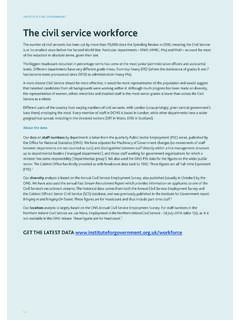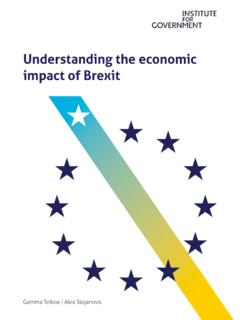Transcription of The UK Shared Prosperity Fund
1 Image areaImage to come to topof picture boxAuthor 1 | Author 2 Alex Nice | Akash Paun | Dan HallIfG ANALYSIS | DEVOLUTIONThe UK Shared Prosperity FundStrengthening the union or undermining devolution? About this reportThis paper looks at the UK government s plans to replace EU structural funds with a new UK Shared Prosperity Fund. It assesses how this fund will interact with the devolution arrangements in Scotland, Wales and Northern Ireland, how the devolved governments could and should be involved in its operation, and what role the new fund plays in the UK government s strategy to strengthen the union. @instituteforgov 20213 CONTENTSC ontentsSummary 4 Introduction 8 How have EU structural funds worked across the UK?
2 9 How does the UK government plan to replace EU structural funds? 16 What are the UK government s goals in creating the UKSPF? 20 What are the risks of the UK government s approach? 24 Conclusion and recommendations 30 References 35 About the authors 394 SUMMARYS ummaryThe UK government plans to replace European Union structural funds with a new UK Shared Prosperity Fund (UKSPF), due to launch in April 2022. This paper assesses those plans specifically, how the new fund will operate in Scotland, Wales and Northern Ireland; what role those nations devolved governments will play; and how this might affect the future of the a member of the EU, the UK received substantial transfers from the EU budget as structural funds.
3 These form a central part of the EU commitment to supporting sustainable development and reducing economic disparities between and within member states, and are used to fund employment and skills programmes, research and innovation, and direct support for business and infrastructure. In the UK, spending is weighted towards relatively deprived regions such as Cornwall and the West of two main structural funds that have operated in the UK are the European Regional Development Fund (ERDF) and the European Social Fund (ESF).* In 2014 20, the EU s last seven-year budget cycle, the UK as a whole was allocated a total of 11 billion from these two funds. EU structural funds were topped up with match funding additional contributions to EU structural fund projects financed domestically a large share of which was provided by the UK and devolved a result of Brexit, all parts of the UK have lost access to future ERDF and ESF support.
4 This has raised the question of what replacement programmes should be put in place of these sources of economic support. This is a question of particular concern to the three devolved nations, since each has received a larger amount of funding per person than England. From the ERDF and ESF combined in the 2014 20 cycle, England was allocated , or 130 per person; Scotland 940 million, or 180 per person; Northern Ireland 510m, or 280 per person; and Wales , or 780 per person. Compared with England, allocations of EU structural funds per person were therefore a little over a third higher in Scotland, more than twice as high in Northern Ireland, and six times as high in Conservative Party s 2019 general election manifesto promised that the new UKSPF would at a minimum match the level of EU spending in each of the four nations of the Following Boris Johnson s victory, his government is now under pressure from the devolved nations to show how it will meet this promise.
5 * The ERDF and ESF are part of a broader set of EU funding programmes that the EU collectively terms European Structural and Investment Funds (ESIF). Other components of the ESIF include the European Agricultural Fund for Rural Development (EAFRD), the European Maritime and Fisheries Fund (EMFF), the Cohesion Fund (CF) and funding to support European Territorial Cooperation (ETC): 5 THE UK Shared Prosperity FUNDH owever, the devolved governments have an interest not just in how much replacement funding will be provided, but in who will decide what this money is spent on. EU structural funds were administered on a devolved basis. This meant the governments in Edinburgh, Cardiff and Belfast took the lead in setting the funding priorities for structural funds within their territories as part of a UK partnership agreement jointly signed by the UK government and the EU.
6 Each of the devolved governments then acted as the managing authorities for disbursing those funds. The UK government was responsible for delivering structural funds only within England, working within the overarching framework agreed with the at Westminster argue that there is an opportunity to design a post-Brexit system for supporting economic growth and regeneration that improves upon the EU framework. As such, the government intends the UKSPF to be: Less bureaucratic than EU structural funds, by cutting overly prescriptive categories , reducing targets and focusing on outcomes over outputs Allocated more quickly than EU structural funds, which can take up to two years to reach local areas from the start of the funding period Better targeted to local places and people in need of funding, such as post-industrial towns, deprived rural and coastal communities, and the long-term unemployed Better aligned with other domestic policy priorities, such as net zero objectives and levelling up , by enabling more holistic, joined-up investment Better able to fund projects that span more than one of the UK nations.
7 For instance to support economic development initiatives across the Anglo-Welsh addition, the government regards the UKSPF as a central plank of its strategy to strengthen the union by showcasing the benefits of Whitehall-led investment in local and regional economies. To that end, ministers will operate the UKSPF through a single UK-wide framework, using new powers under the UK Internal Market Act 2020 to disburse money directly to local partners across the UK. This means the devolved governments are expected to play a marginal role in allocation decisions within their own territories, even though the fund will spend money on matters that lie primarily within the responsibility of the devolved governments, such as transport, skills and economic development.
8 6 SUMMARYThe UK government has stated that the devolved administrations will have a place within the governance structures of the But it has not provided further detail either publicly or to the devolved governments themselves about what these structures will be or what role the devolved bodies will play in approach from the UK government carries risks that could both reduce the effectiveness of the UKSPF and undermine its own objectives. These include: Duplication of functions, with both UK and devolved governments funding similar initiatives in competition with one another Fragmented provision of services, if the UK government grants money to local projects that are not joined up with similar initiatives funded directly by the devolved governments Confused accountability, if UK and devolved ministers end up simultaneously funding similar services such as skills, employment and business support initiatives Funding uncertainty for devolved governments and potential local recipients of the UKSPF.
9 Since there is still little clarity about how funding will be allocated or over how long a period Increased tensions between the UK and devolved governments already high which could undermine the intention to use the UKSPF to showcase the benefits of the union, especially if voters perceive that the fund is being used by ministers to undermine devolution. There are particular concerns relating to Northern Ireland. The Northern Ireland executive has extensive experience of administering EU structural funds in a way that supports community relations. There is a risk that a UK-wide scheme run by the UK government would fail to tap into this expertise and would not secure vital cross-community support in Northern Ireland.
10 These risks are exacerbated by the limited extent to which the UK government has engaged with the devolved governments and other stakeholders during the development of its plans for the UKSPF. It is also yet to conduct a public consultation on the fund. As a result, more than four years after plans for the UKSPF were first announced, and with the fund due to start in April 2022, there are scant details on how it will operate or what role the devolved administrations will play in its governance. 7 THE UK Shared Prosperity FUNDR ecommendations in briefThe UK government is expected to publish a UKSPF investment framework by autumn 2021, followed by further detail on financial allocations in a full spending review.











